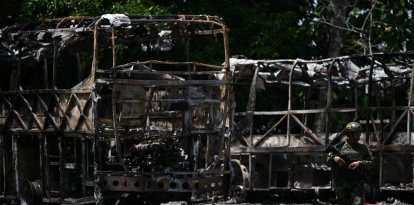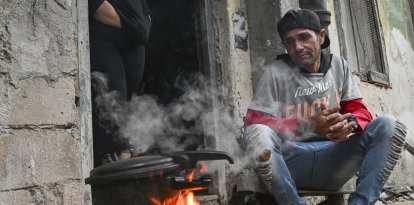Cyril Ramaphosa is re-elected president of South Africa after reaching a coalition agreement
"It is a historic moment in the life of our country, which requires us to work and act together," said the president.

(Wikus De Wet / AFP)
(AFP) The president of South Africa, Cyril Ramaphosa, was re-elected this Friday for a second term by the new Parliament, after his party, the African National Congress (ANC), reached an unprecedented government agreement with the opposition Democratic Alliance (GIVES).
Ramaphosa, 71, received 283 votes, well ahead of the other candidate, Julius Malema of the far-left Economic Freedom Fighters (EFF) party, who received 44.
"I am humbled and honored that you, as members of the National Assembly, have decided to elect me to be the President of the Republic of South Africa," Ramaphosa said in his acceptance speech. It is a historic moment in the life of our country, which requires us to work and act together," added the leader.
His new ally, DA party leader John Steenhuisen, also spoke of a "historic day" and said it is "the beginning of a new chapter of construction, of cooperation."
The ANC, which governed with an absolute majority since 1994, received the most votes in the May 29 elections, but lost its absolute majority and had to negotiate a coalition.
The DA, which came in second in the elections, had announced just before the first session of the new Parliament that it had "reached an agreement on the declaration of intention for the formation of a government of national unity."
ANC Secretary-General Fikile Mbalula said on Thursday that the Government would "gravitate towards the centre" after left-wing parties rejected a deal.
The ANC continues to be the majority in the chamber with 159 of the 400 legislators that the country has, part of the group of emerging powers of the BRICS (Brazil, Russia, India, China and South Africa).
In addition to the ANC and the DA, which has 87 seats, the coalition will include the Inkhata Freedom Party (IFP, 17 seats).
John Steenhuisen considered that this multiparty government was "the best opportunity" for the country to "achieve stability and good clean governance" away from the corruption that tarnished the ANC in recent years.
The DA leader noted that the distribution of ministerial positions has not yet been decided. "We are talking first about values and principles, and then about positions," he added.
The inauguration of the Head of State is scheduled for Wednesday in Pretoria.
In this first session of Parliament on Friday, deputies were sworn in wearing suits and colorful attire.
Thoko Didiza, a politician of Zulu origin who was Minister of Agriculture, was elected as Speaker of Parliament and the vice-president of the assembly went to a DA legislator, Annelie Lotriet.
The Umkhonto We Sizwe (MK) party, created just six months ago by the former head of the ANC and former president Jacob Zuma, who came third in the elections, denounced irregularities in the elections and its parliamentarians boycotted the session.
The EFF deputies, led by former ANC militant Julius Malema and who came fourth, appeared in red worker suits, helmets, boots and Palestinian scarves.
Malema denounced a "marriage of convenience" between the ANC and the DA, which in his eyes represents "white monopoly capital", and promised to form "an effective opposition" against them.
Ramaphosa, 71, promised a new era for South Africa but his detractors accuse him of having mismanaged the economy, with unemployment hitting record highs.
























